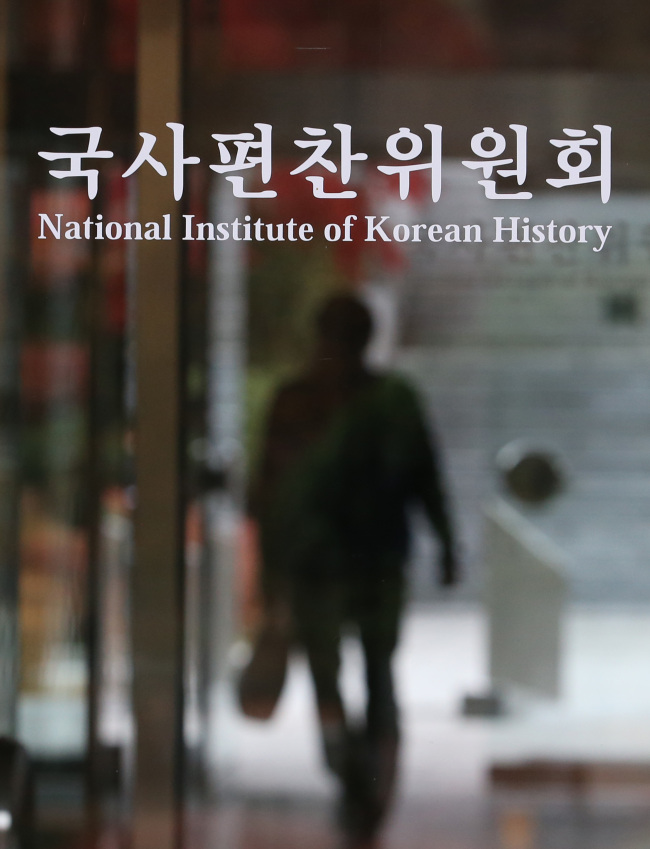Seoul City plans to provide students in middle and high schools with books that chronicle the names of those who sympathized with imperial Japan during its colonial rule of Korea, stoking opposition from the conservatives who claim it is a move to thwart the government’s reinstatement of state-authored history textbooks.
Kim Moon-soo, a member of the Seoul Metropolitan Council, said Monday that the Seoul Metropolitan Education Office would distribute the “Register of Sympathizers of Imperial Japan” to 551 middle and high schools starting from mid-December.
The book, published by Seoul-based left-wing civic group the Center for Historical Truth and Justice, designated 4,389 people as pro-Japanese figures during the 1910-1945 colonial era, including late President Park Chung-hee, father of incumbent President Park Geun-hye.
 |
| The building of National Institute of Korea History. Yonhap |
“I have asked (the city government) about the distribution process and was told that it will start in mid-December,” said Kim in a media interview. In 2014, Seoul city approved a budget for distributing the books to middle and high schools in the municipality.
“Seoul City Council had unanimously passed a legislation for distribution because the city’s lawmakers believe that the current history textbooks’ description of Japan’s colonial rule of Korea was not accurate enough,” said Kim, a member of the main opposition New Politics Alliance for Democracy.
The plan to bring the books to actual classrooms and libraries at schools would require panels of teachers, parents and school officials to decide whether to purchase them from the city’s education authorities.
The opposition from conservative camps also added complexity to the implementation of the policy that has been delayed for a year. Some right-wing civic groups and conservative-minded parents had then protested against the distribution.
The ruling Saenuri Party’s lawmakers on Monday joined the fray. Rep. Ha Tae-kyeung dismissed the book as “biased” and denounced the publisher for advocating a historic perspective that denies the orthodoxy of South Korea.
“If you look at the publishing entity’s mission statement, you can realize that it is pretty much the same as that of now-defunct Unified Progressive Party,” said Ha. The leftist party was dissolved in 2014 by the Constitutional Court’s decision, which said the party had plotted to overthrow the government.
The liberal civic groups welcomed the city’s decision to distribute the books. The Korean Teachers and Educational Workers’ Union, the nation’s biggest progressive teachers’ union, said that the dictionary would serve “educational” purpose and help the students remember “unfortunate” modern Korean history.
The ideological feud over the book came amid burgeoning controversy surrounding the government’s decision to reinstate state-authored textbooks for secondary education. Faced with a public backlash, the government has struggled to select a panel of experts who would author the textbooks.
With a day left for the government to decide the panel, it was reported that about 20 experts had applied for the position. During the recruitment period, a prominent history professor who was to lead the publication project resigned on Friday over a sexual harassment scandal.
Responding to the growing concerns over which experts would take the risk of leading the project, Education Minister Hwang Woo-yea said in a media interview that the government would not reveal the identity of the authors until it finishes publishing the textbooks.
Meanwhile, the teachers and parents were divided over the city government’s policy. Some parents cautioned that some teachers might use what they considered to be “unverified” books to inject their own political views.
“I am not sure whether the books are 100 percent accurate. Considering the fact that the students are susceptible to the influence of their teachers, I am worried that the students might learn biased views of South Korea’s history,” said Kim Jeong-lee, a 45-year-old mother of two middle school students in Seoul.
Some liberal-minded teachers, on the other hand, dismissed the concern, saying that the books would only serve as a historic reference to the Korea’s modern history, not as a textbook that the teachers would employ during the class.
“Even if our school was to purchase the books, I do not plan to use them in class. It is up to the students to make use of the books. I think they would serve as a good academic reference that the students can find in the library,” said Seoul high school teacher who asked to remain anonymous.
By Yeo Jun-suk (jasonyeo@heraldcorp.com)

